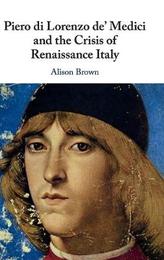
|
Piero di Lorenzo de' Medici and the Crisis of Renaissance Italy
Hardback
Main Details
| Title |
Piero di Lorenzo de' Medici and the Crisis of Renaissance Italy
|
| Authors and Contributors |
By (author) Alison Brown
|
| Physical Properties |
| Format:Hardback | | Pages:350 | | Dimensions(mm): Height 235,Width 160 |
|
| ISBN/Barcode |
9781108489461
|
| Classifications | Dewey:945.06 |
|---|
| Audience | | Professional & Vocational | |
|---|
| Illustrations |
Worked examples or Exercises
|
|
Publishing Details |
| Publisher |
Cambridge University Press
|
| Imprint |
Cambridge University Press
|
| Publication Date |
16 January 2020 |
| Publication Country |
United Kingdom
|
Description
Following the life of one man, Piero de' Medici, Lorenzo the Magnificent's son, Alison Brown sheds new light on several of the most important themes of Renaissance history and culture by combining political history, the history of ideas, and cultural history. This interdisciplinary study weaves together an understudied period of crisis in Italy which brought down three leading dynasties, the revolution that in turn led to the new political realism of writers like Machiavelli, Guicciardini and Francesco Vettori, and, finally, the transition from the civic culture of the early Renaissance to the courtly or princely culture of the Cinquecento. Focusing on Piero's full life and colourful character, Brown grants us a unique and contextualised insight into the patronage, culture and politics of Renaissance Italy whilst grounding broader trends within the lived experience of Florence's most famous ruling family.
Author Biography
Alison Brown is Emeritus Professor of History at Royal Holloway, University of London, having been a British Academy Exchange Fellow at the Newberry Library Chicago, and an Invited Visiting Professor and Fellow at the Harvard Center for Italian Renaissance Studies at the Villa I Tatti Florence. She is the author of the biography Bartolomeo Scala 1430-97, Chancellor of Florence which won the Premio Arnolfo in Colle Val d'Elsa in 1979 and The Return of Lucretius to Renaissance Florence (2010).
Reviews'In this detailed, compelling biography, Piero de' Medici emerges as far more complex and subtle than historians have previously credited. Brown reveals his attempts to navigate an almost-impossible situation as emblematic of the wider transformation of political morality and culture in Italy provoked by the crisis of the 1490s.' Nicholas Scott Baker, Macquarie University, Sydney 'Alison Brown, premier historian of Renaissance Florence, crafted a compelling, revisionist biography of Lorenzo the Magnificent's ill-fated son and heir Pero. The book is carefully researched in the Medici papers and engagingly written. A must read on the Florentine Republic's decline during the disastrous wars that crushed independent Italian city-states.' Melissa M. Bullard, University of North Carolina, Chapel Hill 'Brown's magisterial and elegantly-written study provides the first detailed examination of the career of Piero di Lorenzo de' Medici and offers, in the process, an entirely new perspective on Florentine and Italian politics at the time of the French invasion at the end of the fifteenth century.' William Caferro, Vanderbilt University, Nashville 'Lorenzo the Magnificent's son Piero was blamed for the collapse of the Florentine republic, surrendering to France in 1494. Using overlooked Medici letters, Brown reveals how his attempt to emulate the acrobatic politics of his father, balancing the powers of Italy and his own roles of prince and citizen, drove him to desperation.' Dale Kent, University of California, Riverside 'Brown expertly uses a wealth of unpublished letters to reconstruct the cultural tensions of Piero's life before exile and his fruitless search for repatriation in the complex world of Italian politics. A splendid work that brings new light to a critical period of Italian history.' John Najemy, Cornell University, New York 'This is an impressive monograph that fills a surprising gap in the historiography ... It is archival sleuthing and research at its best. The book adds new nuance to this previously shadowy figure, and in doing so provides a stronger foundation for future studies on the politics of the Italian Peninsula, especially Florence, in the late Quattrocento.' Brian J. Maxson , H-Net
|